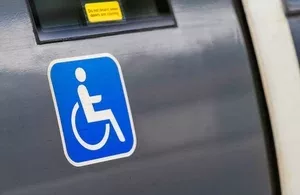The current state of accessible transport is “unjust and unacceptable”, and the government’s efforts to offer “equal access for disabled people” by 2030 have “stalled”, according to a major new report.
Are We There Yet?, released this week by the disabled people’s organisation (DPO) Transport for All, shows that access barriers are “rife” across every form of transport, and at every stage of a journey, reports the Disability News Service.
The report details the findings of a survey carried out during 2022 and 2023, with more than 500 disabled people in England asked about journeys they had made between September 2021 and September 2022.
It covers public transport (bus, train, tram, metro and light rail), private transport (cars, taxis and private hire vehicles), and active travel (walking, wheeling and cycling).
Among its findings, Transport for All (TfA) says in the report that disabled people make far fewer journeys than non-disabled people, with an average of just 5.84 journeys per week, a third of the national average of 17 trips a week.
But those disabled people who wanted to make more journeys said they would make an average of 10.84 journeys a week if transport was fully accessible.
Nearly half of respondents (44 per cent) said they thought that the accessibility of transport and streets would worsen in the next 10 years, while only 28 per cent felt it would improve.
With buses, 51 per cent of respondents experienced issues with priority seating and spaces, such as seats being occupied or not clearly defined, or there being too few of them.
On trains, the most frequent barrier to travel was cost, with 65 per cent of respondents saying this had been a barrier in the last 12 months, while 49 per cent reported overcrowding of trains and stations and 43 per cent highlighted the lack of step-free access or level boarding.
With taxis and private hire vehicles, the most frequent barrier was again cost (with 64 per cent of respondents), while more than a third (34 per cent) said there were not enough wheelchair-accessible vehicles and 29 per cent highlighted the negative attitude of drivers.
One wheelchair-user said: “Taxi turned up with broken ramp despite the booking having been specifically for a wheelchair user.
“I was unable to get to my appointment on time and I had to re-book. This meant that I waited an extra five months for urgent medical treatment. It made me feel angry and upset.”
Seven in 10 survey respondents (71 per cent) said they would like to use environmentally-friendly forms of transport more often – such as walking, wheeling, cycling or taking the bus – but were prevented from doing so by a lack of accessibility and availability.
TfA said transport has the highest greenhouse emissions of any UK sector of the economy, so investing in accessible public infrastructure “is crucial in tackling the climate crisis, and removing barriers would allow millions more journeys to be made sustainable each year”.
Nearly two-thirds of respondents (62 per cent) said they had to plan every journey to make sure it was safe, but the information they needed to do this was often unavailable, inaccurate, or inaccessible.
And 77 per cent of respondents said poor pavement surfaces had caused a barrier to them while they walked or wheeled in the previous 12 months, including problems with bumps, potholes, tree roots, broken tiles, and narrow width.
This was the most frequently-cited barrier of any form of transport.
One respondent said: “The road to my nearest bus stop is in awful repair. I have damaged my wheelchair and nearly fallen out of it due to bad paving.
“I have to go on an alternative route which takes twice as long to get me to the bus stop. And my chair is now damaged.”
Among its many recommendations, the report calls for the government to investigate why progress towards its 2030 target of “equal access for disabled people” – laid out in its 2018 Inclusive Transport Strategy – has stalled.
It also calls for “meaningful” engagement with disabled people and DPOs by government and transport bodies; a new regulator to enforce the right to accessible transport under equality laws, and gather data on compliance; and ring-fenced investment in “accessible and reliable public transport options”.
And the report calls for a “significant and swift change to the approach to concessions for travel for disabled people, overhauling the eligibility criteria, and standardising concessions across modes to ensure equity and fairness”.
Caroline Stickland, TfA’s chief executive, said: “It is unacceptable that millions of us are still prevented from going out, seeing loved ones, accessing work, education, and medical care because of inaccessible transport.
“It is now the responsibility of decision makers to listen to our experiences and remove the discriminatory barriers that are holding our community back.”


















